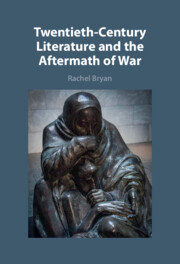Book contents
- Twentieth-Century Literature and the Aftermath of War
- Twentieth-Century Literature and the Aftermath of War
- Copyright page
- Dedication
- Epigraph
- Contents
- Acknowledgements
- Abbreviations
- Introduction
- Chapter 1 Untimely Deaths and Artful Promise in Henry James’s Post-1890 Writings
- Chapter 2 Reading Henry James in First World Wartime
- Chapter 3 Imaginary Widowhood in Elizabeth Bowen’s ‘A Year I Remember – 1918’ and A World of Love
- Chapter 4 Retroactive Judgements in Elizabeth Bowen’s The Heat of the Day
- Chapter 5 Traitors, Treason, and ‘Topsy-Turvy’ Values in Kazuo Ishiguro’s ‘The Summer After the War’ and An Artist of the Floating World
- Chapter 6 Art and Consolation in Kazuo Ishiguro’s Never Let Me Go
- Index
Chapter 3 - Imaginary Widowhood in Elizabeth Bowen’s ‘A Year I Remember – 1918’ and A World of Love
Published online by Cambridge University Press: 20 December 2024
- Twentieth-Century Literature and the Aftermath of War
- Twentieth-Century Literature and the Aftermath of War
- Copyright page
- Dedication
- Epigraph
- Contents
- Acknowledgements
- Abbreviations
- Introduction
- Chapter 1 Untimely Deaths and Artful Promise in Henry James’s Post-1890 Writings
- Chapter 2 Reading Henry James in First World Wartime
- Chapter 3 Imaginary Widowhood in Elizabeth Bowen’s ‘A Year I Remember – 1918’ and A World of Love
- Chapter 4 Retroactive Judgements in Elizabeth Bowen’s The Heat of the Day
- Chapter 5 Traitors, Treason, and ‘Topsy-Turvy’ Values in Kazuo Ishiguro’s ‘The Summer After the War’ and An Artist of the Floating World
- Chapter 6 Art and Consolation in Kazuo Ishiguro’s Never Let Me Go
- Index
Summary
This chapter focuses on two of Elizabeth Bowen’s works – a semi-autobiographical play, ‘A Year I Remember – 1918’ (1949), and a novel, A World of Love (1955) – which register a phenomenon that historian Katherine Holden has termed ‘imaginary widowhood’. This psychological coping mechanism, encouraged by newspaper headlines, political speeches, and educators in the interwar years, allowed Britain’s two million ‘surplus’ women to view themselves not as shameful spinsters, but as those who had lost their rightful husbands in the Great War. The first half of the chapter charts competing representations of unmarried women in the early twentieth century and notes the attention paid to ‘imaginary widowhood’ in both Bowen’s The Hotel (1927) and ‘A Year I Remember – 1918’. Concluding with A World of Love, the chapter ends by arguing that Bowen’s long-term interest in this type of consolatory counterfactual produced a tonally complex mid-century novel, whose formal exploration of the imaginative and conceptual limits of traditional literary plots echoes the struggle of its two heroines as they weigh up the benefits of continuing to see themselves as the would-be widows of a long-dead soldier.
Keywords
- Type
- Chapter
- Information
- Twentieth-Century Literature and the Aftermath of War , pp. 114 - 148Publisher: Cambridge University PressPrint publication year: 2025

